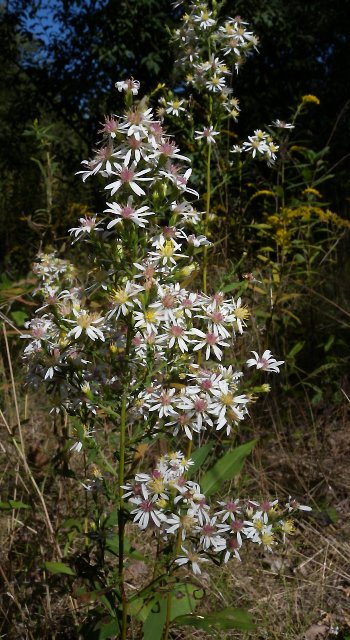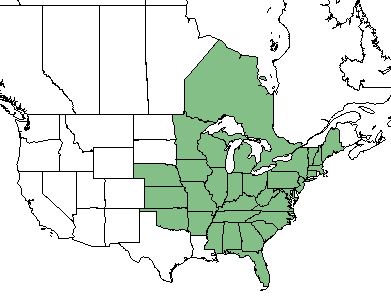Symphyotrichum urophyllum
| Symphyotrichum urophyllum | |
|---|---|

| |
| Photo by John Hilty hosted at IllinoisWildflowers.info | |
| Scientific classification | |
| Kingdom: | Plantae |
| Division: | Magnoliophyta - Flowering plants |
| Class: | Magnoliopsida - Dicots |
| Order: | Asterales |
| Family: | Asteraceae |
| Genus: | Symphyotrichum |
| Species: | S. urophyllum |
| Binomial name | |
| Symphyotrichum urophyllum (Lindl.) G.L. Nesom | |

| |
| Natural range of Symphyotrichum urophyllum from USDA NRCS Plants Database. | |
Common Name(s): white arrowleaf aster[1][2]
Contents
Taxonomic Notes
Synonym(s): Aster sagittifolius Wedemeyer ex Willendow; A. urophyllus Lindley ex A.P. de Candolle.[3]
Description
Symphyotrichum urophyllum is a dioecious perennial forb/herb.[2] It prefers dry sandy loamy soils and produces white flowers.[4]
Distribution
This species can be found from Maine, south to Florida, westward to Mississippi, and inland to Oklahoma, Kansas, Nebraska, Minnesota and the remaining eastern portion of the United States.[1][2] It is also found in the Ontario province of Canada.[2]
Ecology
Habitat
S. urophyllum occurs in woodlands, savannahs, forest edges, prairies, meadows, oak woods, river banks, and fields.[4][5] It is also found in disturbed areas including upland hardwood forest remnants, boat ramp areas, clay roadsides, and field tracks.[5]
Associated species: Juniperus, Aster oolentangiensis, Schizachyrium scoparium, Quercus velutina, Quercus alba, Agrostis perennans, Prenanthes altissima , Silene stellata, Polygonum virginianum, Solidago ulmifolia, and Andropogon.[6][7][8]
Phenology
Flowering occurs in late August through October.[1]
Fire ecology
Populations of Symphyotrichum urophyllum have been known to persist through repeated annual burning.[9]
Pollination and use by animals
This species is known to attract a variety of butterflies and native bees.[4]
Conservation, cultivation, and restoration
Cultural use
Photo Gallery
References and notes
- ↑ 1.0 1.1 1.2 Weakley AS (2015) Flora of the Southern and Mid-Atlantic States. Chapel Hill, NC: University of North Carolina Herbarium.
- ↑ 2.0 2.1 2.2 2.3 USDA NRCS (2016) The PLANTS Database (http://plants.usda.gov, 12 January 2018). National Plant Data Team, Greensboro, NC 27401-4901 USA.
- ↑ Weakley, A.S. 2015. Flora of the southern and mid-atlantic states. Working Draf of 21 May 2015. University of North Carolina at Chapel Hill, Chapel Hill, North Carolina.
- ↑ 4.0 4.1 4.2 Plant database: Symphyotrichum urophyllum. (12 January 2018) Lady Bird Johnson Wildflower Center. URL: https://www.wildflower.org/plants/result.php?id_plant=SYUR
- ↑ 5.0 5.1 Florida State University Herbarium Database. URL: http://herbarium.bio.fsu.edu. Last accessed: June 2021. Collectors: Loran C. Anderson, Kathleen Craddock Burks, R.K. Godfrey, and Richard S. Mitchell. States and counties: Florida: Jackson and Jefferson.
- ↑ Academy of Natural Sciences of Drexel University accessed using Southeastern Regional Network of Expertise and Collections (SERNEC) data portal. URL: http://sernecportal.org/portal/collections/index.php Last accessed: June 2021. Collectors: Ann Newbold. States and Counties: Pennsylvania: Montgomery.
- ↑ Calvin College accessed using Southeastern Regional Network of Expertise and Collections (SERNEC) data portal. URL: http://sernecportal.org/portal/collections/index.php Last accessed: June 2021. Collectors: David Warners. States and Counties: Michigan: Missaukee.
- ↑ Illinois Natural History Survey accessed using Southeastern Regional Network of Expertise and Collections (SERNEC) data portal. URL: http://sernecportal.org/portal/collections/index.php Last accessed: June 2021. Collectors: F.M. Harty, Shannon L. Horn, and Loy R. Phillippe. States and Counties: Illinois: Kankakee.
- ↑ Platt, W.J., R. Carter, G. Nelson, W. Baker, S. Hermann, J. Kane, L. Anderson, M. Smith, K. Robertson. 2021. Unpublished species list of Wade Tract old-growth longleaf pine savanna, Thomasville, Georgia.